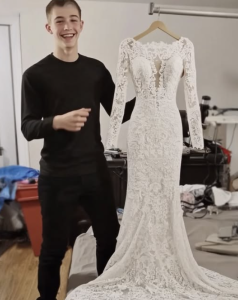
My Sister Excluded My Son from Her Wedding After He Made Her Dress, but Still Expected to Wear It
My heart still aches when I think about what happened. My son, Liam, poured his soul into designing and sewing my sister’s wedding dress — a masterpiece crafted with love, creativity, and a sense of pride. He thought he was helping to make her big day unforgettable. What we didn’t know was that her vision didn’t include him.
It started a year ago when my sister, Emily, got engaged. She came to me bubbling with excitement, and during one of our many wedding-planning coffee chats, Liam passed by. He’s 22, a talented young fashion designer who studied at a respected arts school. Emily had always gushed over his talent. That day, she casually asked him, “Hey, do you think you’d be up for making my dress?”
Liam was stunned but flattered. She said she wanted something custom, something “elegant, timeless, but with a modern flair.” Liam sketched for days, sourcing fabric samples, pinning ideas, and presenting options. She loved his vision. The design process began.
Over the following months, Liam dedicated his evenings to perfecting that dress. He gave up social events, declined freelance work, and even took unpaid time from his part-time job to finish it on time. He handcrafted lace detailing, incorporated intricate beadwork by hand, and made sure the fit flattered her perfectly. She came over almost weekly for fittings, each time complimenting his work.
I watched him glow with purpose. He believed this was a career-defining moment — his first major piece worn at a high-profile event, surrounded by photographers and guests. He imagined people asking, “Who made that dress?” and hoped doors might open.
Then the wedding invitations went out.
When ours arrived, I was stunned to see it was addressed only to me — no mention of Liam.
Assuming it was a clerical error, I texted Emily. “Hey, I think you forgot to include Liam on the invite?”
Her reply came swiftly: “No, not a mistake. We’re trying to keep the guest list small. No kids or extras.”
Liam is 22.
I replied, “He’s not a kid, Em. He’s your nephew. He’s the one making your dress.”
She responded, “I know, but it’s not personal. It’s just that we have limited space, and a certain… vibe. I hope you understand.”
I didn’t.
Liam was in the room when I read her texts. His face fell, but he tried to hide it. “It’s okay,” he said. “Maybe she just forgot how small the venue is.”
But I knew that wasn’t it. I later discovered through social media that her fiancé’s cousins, some college friends, and even distant acquaintances were invited. People she hadn’t spoken to in years. Liam? The man who labored over her gown for months? Excluded.
He still finished the dress.
He didn’t want to let her down. He didn’t want to tarnish her big day or be the reason there was tension. When he zipped up the back of that gown during her final fitting, he smiled and said, “You look beautiful.” She hugged him — casually, maybe even awkwardly. Then she said, “I can’t wait to walk down the aisle in this.”
Not “Thank you.” Not “I’m sorry you won’t be there.” Just, “I can’t wait to wear it.”
Two days before the wedding, Liam came to me quietly and said, “I’ve changed my mind. I don’t want her to wear the dress.”
I blinked. “What?”
“I can’t pretend it’s okay. She cut me out like I was invisible. Like my work mattered but I didn’t.”
He didn’t want to create drama, but he felt devalued. After all he’d given, he wasn’t even considered worthy of being in the room.
We sat together and drafted a simple message. He texted her: “Hey Emily. After thinking long and hard, I’ve decided I’m not comfortable with you wearing the dress I made for your wedding, given that I’m not invited. I put everything into that dress, and it hurts to be excluded. Please understand this isn’t out of anger, but out of hurt.”
Her response was immediate — and vicious.
“You’re being selfish and dramatic. This is MY day. You’re punishing me for a simple decision. I trusted you with my dress, and now you’re using it to manipulate me. Grow up.”
He didn’t reply.
Instead, he went to her place, picked up the dress, and left her a note: “This wasn’t manipulation. It was heartbreak.”
The wedding still happened. She found a dress last minute — store-bought, rushed, not even close to what Liam had made.
Some relatives are furious with me, accusing us of ruining her wedding. They say Liam should’ve “sucked it up” and let her have the dress. But I stand by him.
This wasn’t just about fabric and stitching. It was about respect.
Liam gave her art. She gave him an empty seat.
Weeks have passed. Emily hasn’t spoken to us since. Some in the family are taking sides. Others are trying to stay neutral. But Liam? He’s channeling the pain into his work. He’s now preparing a new line inspired by betrayal and rebirth.
“I’m done letting people see me as invisible,” he told me. “If they don’t give me a seat, I’ll build my own table.”
And he will.
Because while my sister may have worn white that day, the only person who showed true grace and dignity was the one she left off the guest list.
